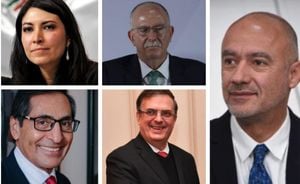Sri Lanka has made significant waves globally after the recent parliamentary elections heralded the rise of Anura Kumara Dissanayake's National People's Power (NPP), which achieved unprecedented success. With the party capturing 159 out of 225 seats, this two-thirds majority marks the first time since the shift to proportional representation in 1977, allowing for substantial legislative power and potential constitutional amendments without coalition dependencies.
The elections held on November 14, 2024, come on the heels of Dissanayake's presidential victory just two months earlier. This recent triumph signals the electorate's desire for change from the longstanding political establishment bruised by years of corruption and mismanagement, culminating catastrophically during the 2022 economic crisis. The public was eager to reject the old guard, which included the Rajapaksa family, who ruled for two decades, and engage with new political dynamics shaping the island nation.
On election day, the atmosphere was charged with anticipation. Many voters exemplified the hope for reform, voicing aspirations for improved economic conditions, social justice, and governance. During the voting, potential clashes flared as citizens expressed their grievances. One notable exchange occurred when Abdul Rahuman Seyyadu Sulaiman, 56, attempted to vocalize urgent issues to Dissanayake at the polling station, illustrating the desire for direct communication between governance and the populace. Sulaiman highlighted the injustices faced by the Muslim community, asking, "I want Dissanayake to listen to the woes of my people."
The NPP's sweeping victory was fueled by its promises to fight corruption, and they have now elevated these hopes by winning the Jaffna district, traditionally held by Tamil parties. This shift suggests not just tactical political maneuvering but also hints at broader aspirations from once-marginalized communities seeking representation. The NPP's focus on civil society and grassroots organizing during the socio-political upheaval of 2022 reflects its alignment with popular discontent against the previous regime, seen as responsible for the economic hardship faced by many Sri Lankans.
Dissanayake’s platform revolves around economic stability and comprehensive reforms intended to alleviate poverty and address pervasive inflation. Following the previous regime's reliance on severe austerity measures via agreements with the International Monetary Fund, many citizens have remained skeptical of traditional politics and are searching for real, actionable improvements to their daily lives. For Vasantha Raj, 38, who expressed his disillusionment with older political figures, linearly voting for candidates without name recognition symbolized the longing for authenticity and reliability: "We have been voting for the same people for years and nothing has changed. This time, we’ll see what these ones [the NPP] do.”
Political analysts note the NPP's successful campaign as reflective of broader systemic change. Aruna Kulatunga, for example, articulated how the results demonstrate the potential for unity across political factions traditionally reserved for faction-based politics. He emphasized how this result provides Sri Lankan politics with "the opportunity to unite behind a single party without the horse-trading" synonymous with past coalition governments.
This decisive electoral outcome also positions Dissanayake without the need for coalition partners, allowing legislative proposals and reforms to move forward with more efficiency. Following the vote, there are immediate discussions about passing new constitutional amendments, which have not been amended since the mid-2010s when political streams began to diverge. The possibility of setting forth new laws and structures via constitutional referendum has heightened expectations.
But what lies behind this victory is the palpable reality of difficult challenges. With high public expectations, there’s pressure for the newly elected government to fulfill its campaign promises against the backdrop of continued economic strife. Inflation has soared, with food and medicine costs rising to the brink of unaffordability for the struggling population. MF Sareena, 63, encapsulated this utility when she remarked on her desire for the new government to not only roundly address poverty but also bring substantial relief, commenting, "Food prices are high, and medicines are unaffordable. We hope things will change soon.”
While Dissanayake’s government will move with cautious optimism, observers are already raising concerns about the realities of transitioning policy proposals to change. It's noted as imperative for his administration to strike the right balance between immediate relief for struggling families, like bringing down costs, and long-term strategies aimed at securing economic stability.
Despite the majority victory for the NPP, the struggle to fulfill its commitments remains formidable. Sri Lanka recently came out of a historical crisis characterized by rampant inflation, food shortages, and stagnant growth rates. These problems were dramatically highlighted during the mass protests of 2022, leading to the ousting of then-President Gotabaya Rajapaksa. The tumult of unrest positioned the NPP uniquely, but simply winning elections does not automatically translate to enduring success or effective governance. Time will tell whether Dissanayake can adequately respond to his citizens' needs and deliver on the transformative agenda he campaigned upon.
Nonetheless, there's optimism as the NPP’s leadership recognizes the unique opportunity presented. The secretary of the NPP, Nihal Abeysinghe, noted, "We will not misuse this power, just like the people who have done it in the past." This sentiment reflects both the nostalgia for what has been lost and the fervent hope for what can be regained through competent governance as they manage the transition to power. The coming weeks will be telling as the new administration seeks to implement reforms, putting the historic mandate to work.
Though the recent election results signal possible change, much work lies ahead. The NPP must carve new paths to address entrenched issues such as corruption, socioeconomic divides, and market volatility. Critics and supporters alike will be watching closely to see how far the NPP can stretch its mandate and whether it can genuinely address the systemic issues plaguing the nation. Amid the challenges, the spirit of Sri Lanka's people, resilient and hopeful, stands as the true measure of the future, ready to embrace what lies at the horizon of their newly transformed political climate.



